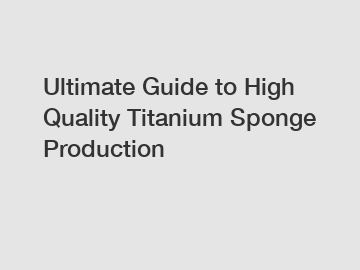Ultimate Guide to High Quality Titanium Sponge Production
Titanium sponge production is a crucial step in the manufacturing process of titanium-based products. Titanium sponge is a porous, high-purity form of titanium that is produced through the reduction of titanium tetrachloride (TiCl4) with magnesium or sodium in a vacuum or inert atmosphere. It acts as the raw material for various titanium alloys, which are used in industries such as aerospace, automotive, medical, and more.
In this ultimate guide, we will delve into the intricacies of high-quality titanium sponge production, focusing on the key steps, best practices, and challenges faced in the industry. From understanding the raw materials to optimizing production processes, we will provide you with comprehensive insights to help you achieve excellence in titanium sponge production.
1. Raw Materials Selection:

The quality of titanium sponge largely depends on the selection of raw materials. Titanium tetrachloride (TiCl4) is the primary precursor used in the production process. It is essential to ensure the purity and consistency of TiCl4 to achieve high-quality titanium sponge. Additionally, the choice of reducing agent, such as magnesium or sodium, plays a critical role in determining the final product quality. Selecting high-grade raw materials is the first step towards producing top-notch titanium sponge.
2. Reduction Process Optimization:
The reduction process involves the reaction between TiCl4 and the reducing agent to form titanium sponge. This step is crucial in determining the purity and texture of the final product. It is essential to optimize the reduction process parameters, such as temperature, pressure, and gas flow rates, to achieve high-quality titanium sponge. Continuous monitoring and control of these parameters are necessary to ensure consistent product quality.
3. Purification Techniques:
After the reduction process, the titanium sponge undergoes various purification techniques to remove impurities and enhance its purity. These techniques include vacuum distillation, leaching, and electrorefining. Each method has its advantages and challenges, and the selection of the appropriate purification technique depends on the desired purity levels and end-use applications of the titanium sponge.
4. Particle Size Control:
The particle size of titanium sponge plays a crucial role in its final properties and applications. Controlling the particle size distribution is essential to ensure uniformity and consistency in the product. Various methods, such as sieving, crushing, and milling, can be used to achieve the desired particle size range. It is important to optimize these processes to meet the specifications of different end-users and industries.
5. Quality Control and Testing:
Quality control is an integral part of high-quality titanium sponge production. Regular testing and analysis of the product at different stages of production are essential to ensure compliance with quality standards and specifications. Physical, chemical, and metallurgical tests help in determining the purity, composition, and mechanical properties of the titanium sponge. Maintaining strict quality control measures is imperative to deliver top-notch products to customers.
6. Environmental Considerations:
Titanium sponge production involves various chemical processes that can have environmental implications. It is essential to adhere to environmental regulations and implement sustainable practices to minimize the impact on the environment. Recycling and reusing process by-products, optimizing energy consumption, and reducing waste generation are some of the ways to promote eco-friendly titanium sponge production.
7. Industry Trends and Innovations:
The titanium industry is constantly evolving, with new technologies and innovations shaping the production processes. Continuous research and development efforts are underway to enhance the efficiency, quality, and sustainability of titanium sponge production. Innovations such as additive manufacturing, advanced purification techniques, and novel production methods are driving the industry towards greater heights. Staying updated on industry trends and embracing innovations is crucial for maintaining a competitive edge in the market.
In conclusion, high-quality titanium sponge production requires a combination of expertise, precision, and innovation. By following the best practices and utilizing advanced techniques, manufacturers can achieve excellence in titanium sponge production. Understanding the raw materials, optimizing processes, ensuring quality control, and embracing industry trends are key factors in producing top-notch titanium sponge. With a commitment to quality and sustainability, the titanium industry can continue to thrive and meet the growing demand for titanium-based products.
Want more information on aluminum iron alloy wholesale, Manganese Tablets for aluminum casting, Metal Element Additives Manufacturer? Feel free to contact us.


